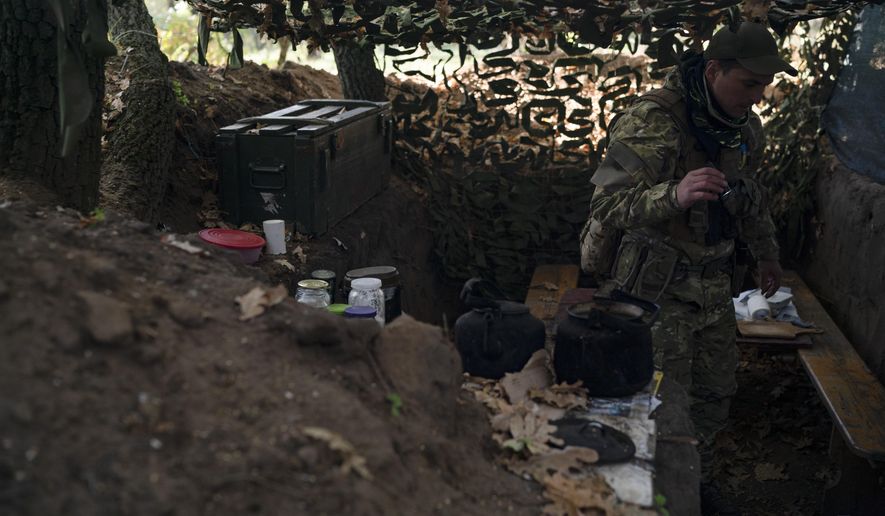Ukrainians ramped up a weekend-long celebration Sunday after Russian troops fled the strategic regional capital of Kherson following a nearly nine-month occupation, but city officials now face a monumental task to restore electricity and clean water services amid the “humanitarian catastrophe” left behind by the retreating Russians.
The recapture of Kherson could mark a turning point in the war, analysts say, as it has fueled momentum on the Ukrainian side while sparking fresh criticism at home for Russian President Vladimir Putin’s war effort and more questions about his generals’ competence.
The Russian retreat across the strategically vital Dnieper River also opens up new avenues for Ukrainian forces to press their counteroffensive, perhaps even putting the Crimean Peninsula — which Russian troops and their proxy groups have held since 2014 — within striking distance.
But for Kherson residents, there are more pressing concerns. Ukrainian President Volodymyr Zelenskyy said late Saturday that his troops have already removed nearly 2,000 mines, trip wires and other explosives left by Russian troops. Russian forces also intentionally destroyed as much infrastructure as possible before leaving Kherson, one of the first major urban areas to fall to the Kremlin after the invasion was launched on Feb. 24.
“The occupiers destroyed all critical infrastructure — communication, water supply, heat, electricity,” Mr. Zelenskyy said in a televised address. “But we will restore everything. Believe me. Although it takes time for this, it is already clear to everyone that the outcome will be ours, the Ukrainian one.”
Officials in Kherson and its outlying villages said they’ve focused first on restoring electricity and clean water for residents.
Russian troops captured Kherson in late February. Their retreat from Kherson marks arguably the greatest humiliation of the conflict for Mr. Putin, who just two months ago formally signed the papers “annexing” the Kherson province. Russian forces still control an estimated 70% of the Kherson province, but their pullout from Kherson city calls into question the long-term Russian ability to defend the larger region.
Indeed, the Russian retreat from Kherson is fueling hopes that the tide has fully turned in Ukraine’s favor.
“Ukrainians have just won an extraordinary victory where the one regional capital that Russia had seized in this war is now back under a Ukrainian flag. And that is quite a remarkable thing,” White House National Security Adviser Jake Sullivan said over the weekend.
Indeed, even with winter coming on, Mr. Zelenskyy vowed that Ukrainian troops will press the advantage and will seek to drive Russian forces out of all Ukrainian territory, including Crimea, the rest of Kherson, and other eastern Ukrainian provinces that Mr. Putin claimed to annex.
But Ukrainian leaders also face the daunting task of rebuilding Kherson and other cities devastated by war. Even as citizens took to the streets and waved Ukrainian flags in celebration, Kherson officials announced they’ll maintain a strict 5 p.m. curfew as a security measure, and to allow crews to work around the clock to begin restoring vital services.
“The enemy mined all critical infrastructure objects,” Yaroslav Yanushevych, governor of the Kherson region, said Sunday, according to Reuters.
Other local officials said that most homes have no electricity and no running water. Cellphone service also has been largely wiped out.
Kherson and its surrounding villages also face grave shortages of food and medicine. One Ukrainian official told The Associated Press on Sunday that the situation inside the city is nothing less than a “humanitarian catastrophe.”
Meanwhile, military analysts say the fall of Kherson has increased the pressure on Mr. Putin. Moscow has tried to spin the Kherson retreat as a simple repositioning of its forces, and as a step to protect civilians in Kherson who would otherwise be caught in the middle of bloody urban warfare.
But some pro-war elements in Moscow believe Mr. Putin isn’t pressing hard enough. Pressure from those hardliners is squeezing Mr. Putin from one side, while a sizable portion of the population remains deeply opposed to continuing the war at all.
Raw recruits from Mr. Putin’s recent troubled mobilization of reserves also are said to be bearing the brunt of the fighting in many parts of the disputed Donbas region.
“Putin is having a harder time appeasing parts of the highly ideological pro-war constituency due to his military’s inability to deliver his maximalist goals of overthrowing the Ukrainian government and seizing all of Ukraine,” the Institute for the Study of War think tank said in a weekend analysis. “The ever-increasing doubts among extreme Russian nationalists about Putin’s commitment to Russian ideology reduce Putin’s appeal to the nationalist community, while mobilization and high casualties will likely continue to upset members of Russian society.”
• This article is based in part on wire-service reports.
• Ben Wolfgang can be reached at bwolfgang@washingtontimes.com.




Please read our comment policy before commenting.